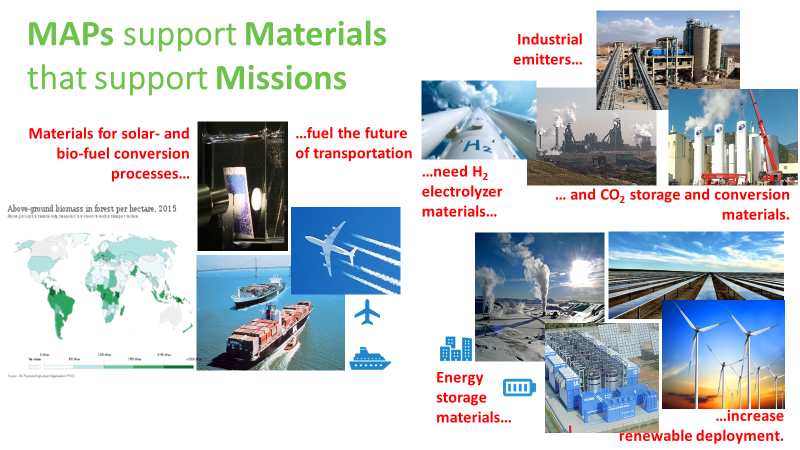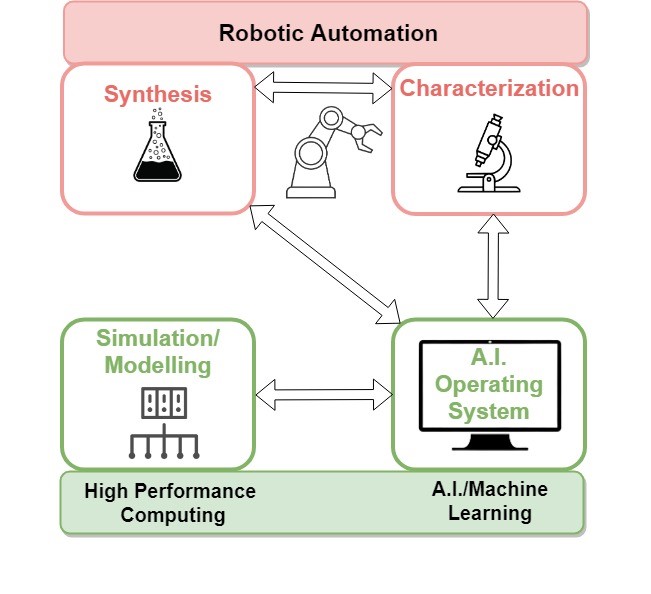
With materials accounting for at least half of clean energy’s costs, new ‘Materials Acceleration Platforms’ are springing up around the world
By Dr. Mark S Kozdras (MI Materials for Energy Co-lead, Program Manager at Natural Resources Canada)
Materials for Energy (M4E) is a new collaborative initiative within the MI Innovation Platform. Emerging from the success of the Clean Energy Materials Innovation Challenge (IC6), M4E will leverage the innovation community that has developed around autonomous or self-driving laboratories to discover and develop clean energy materials that offer cross-cutting support to MI Missions and other Platform initiatives.
It will benefit from major infrastructure investments, particularly in Canada where a $70 million Centre for Accelerated Materials Discovery and Innovation (CAMDI) is under construction to promote and support international collaboration and training. M4E will also benefit from the recent funding of the German-Canadian Materials Acceleration Centre (GC-MAC), as well as European Commission grants for Autonomous Discovery of Advanced Materials (ADAM), Storage Research Infrastructure EcoSystem (StoRIES) and the Battery Interface Genome-Materials Acceleration Platform (BIG-MAP).
M4E will accelerate energy materials discovery and development through the deployment of Materials Acceleration Platforms (MAPs), which harness the strengths of three advanced technologies: 1) artificial intelligence; 2) smart robotics; and 3) high performance computing. The goal is to realize solutions to energy materials challenges more than 10 times faster than conventional laboratory methods.[1]
As examples, MAPs platforms have been developed in: Canada (Project Ada and the Matter lab), Germany (Amanda1), the UK (MIF) and the US (ARES and Lego Chemistry).
Additional MAPs are under development in Canada for thermoelectric materials, 3D printing, and electro-catalyst/electrochemistry (for hydrogen production, conversion of CO2 to fuels, and corrosion applications). Further, a call for proposals for multiple MAP systems is advancing in India, with Italy launching its energy materials MAP this year.
Given that materials make up 50 to 80 percent of the cost of clean energy, M4E will play a critical, cross-cutting role in MI 2.0 by supporting the materials innovation needs of MI Missions and other activities under the Innovation Platform. M4E will support energy materials for hydrogen, CCUS, biofuel conversion, energy storage and renewables deployment. We are also exploring opportunities in large GHG emitters including structural materials like cement and concrete.
There is enthusiasm to advance this work, with Germany joining as co-lead of M4E, and with the US positioned to contribute to this collaborative initiative after co-leading IC6 through its inception. Our goal is to intensify collaboration between MI members to establish a materials discovery platform that speeds progress by combining cross-cutting research areas. Currently, the European Energy Research Alliance (EERA) is organizing a workshop series on “Energy Materials for Innovation” (EM4I). The five-event series covers the integral phases of materials research, from discovery to scale-up production, device development, industrial integration and sustainability, as well as the cross-cutting technologies that support these activities.
M4E is positioned to help reduce global emissions through bold initiatives that move research to development and commercialization of clean energy technologies.
Contact us to learn more on how you can get involved.
[1] https://onlinelibrary.wiley.com/doi/full/10.1002/adma.201907801
